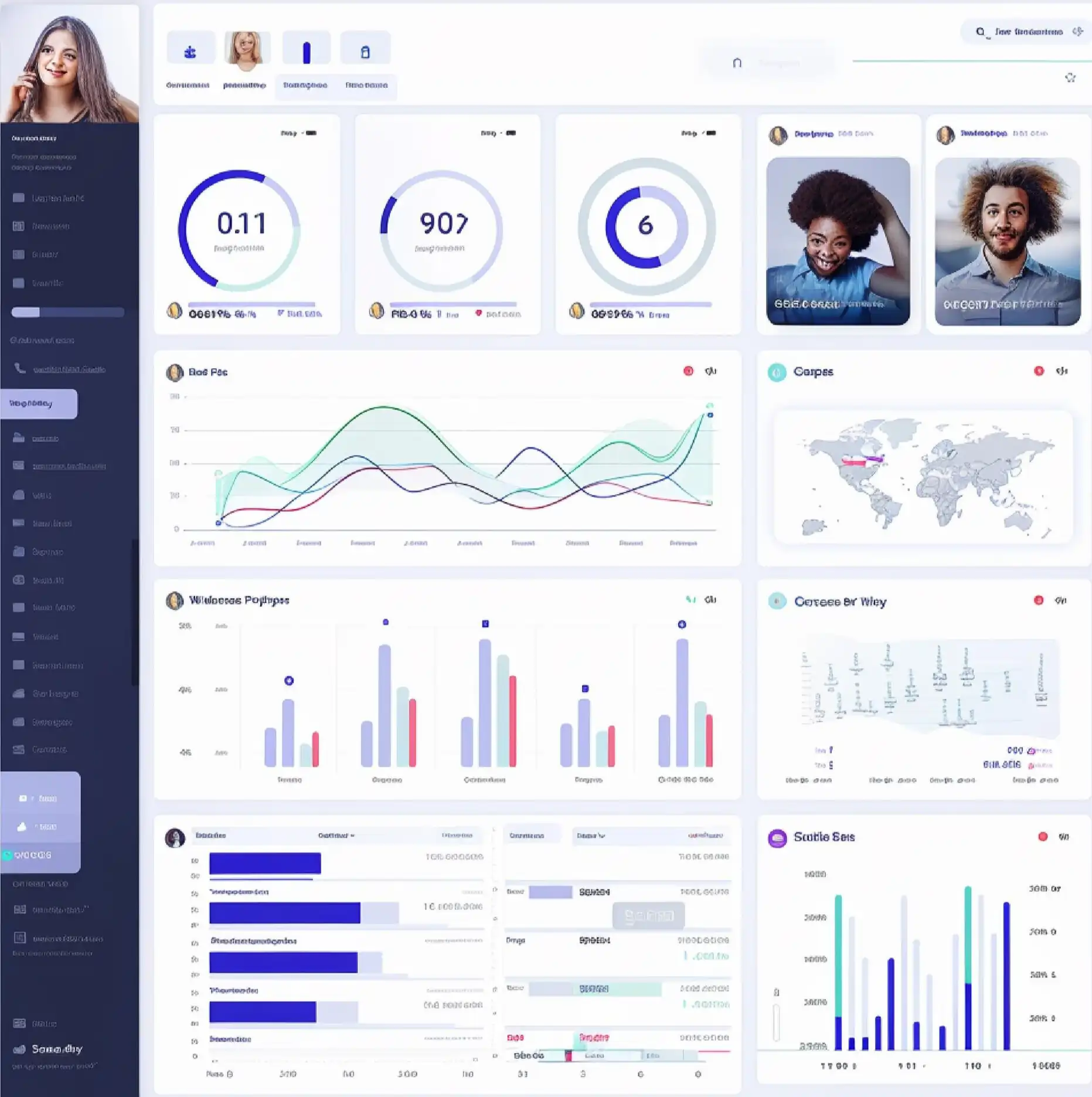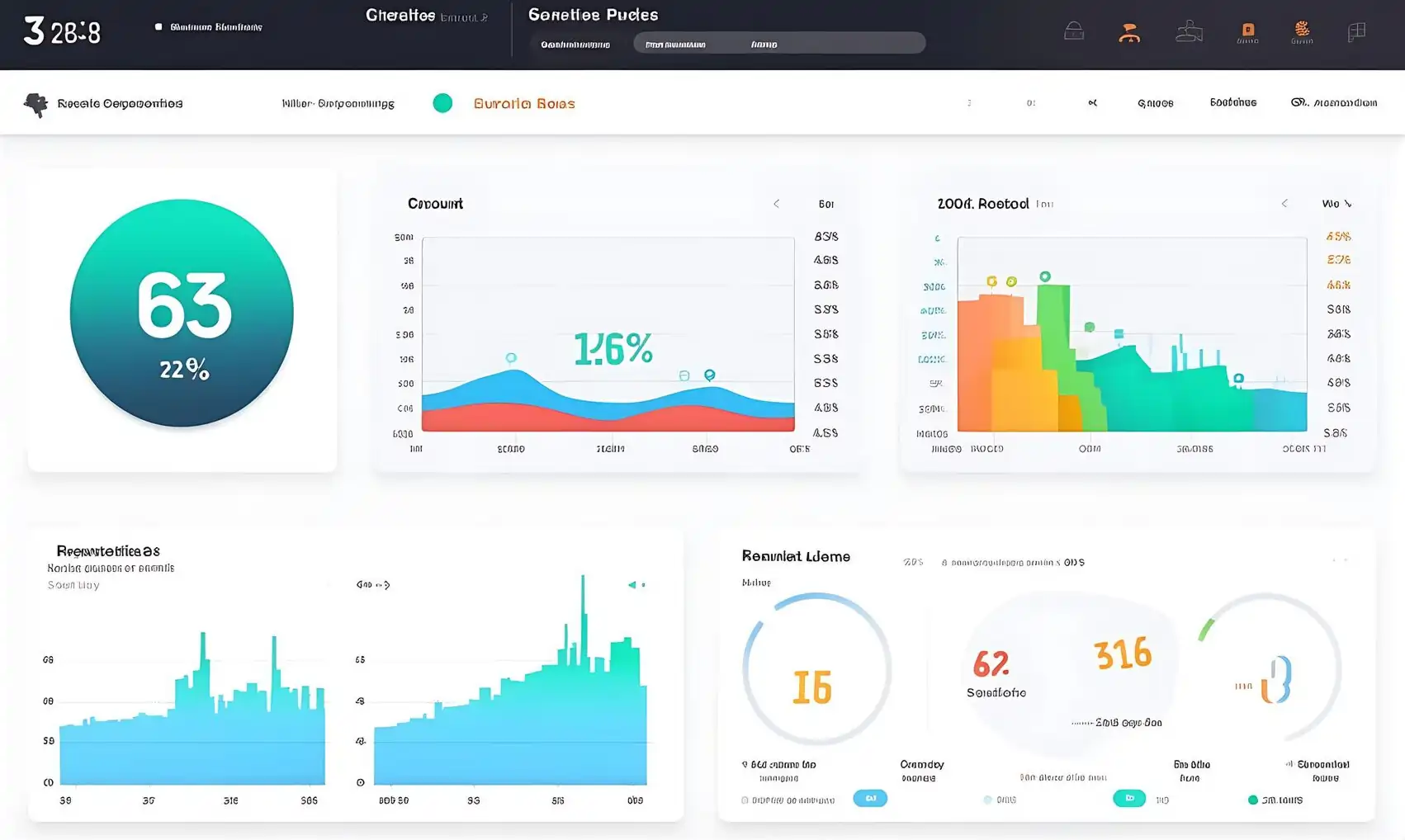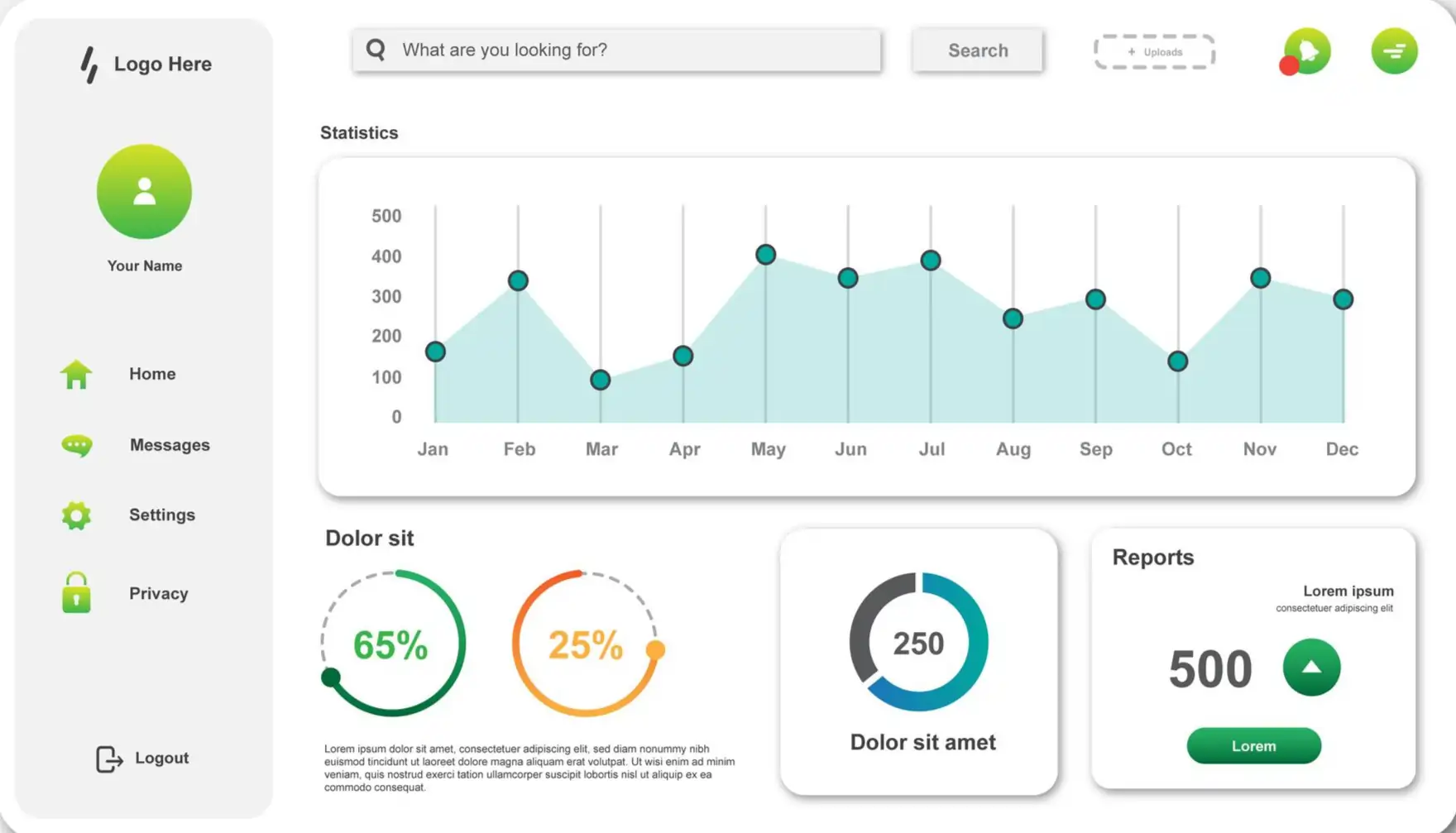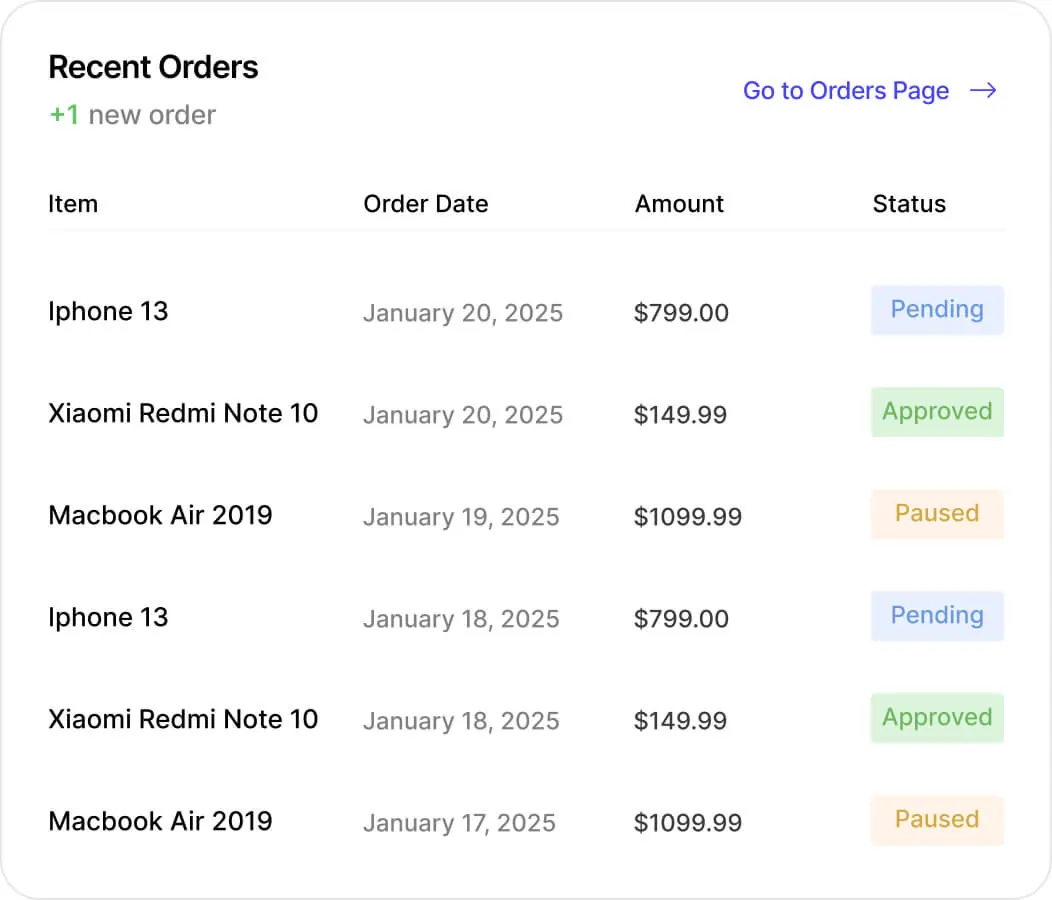Explore all of our Bussus Software features
BUSSUS CRM offers a comprehensive suite of features designed to streamline your business processes, enhance customer relationships, and drive growth.

Sales Force Automation (SFA)
Real-time sales, inventory, route, attendance, expense tracking.
Real-Time Sales Tracking for instant activity insights.
Order & Inventory Management to streamline processing and stock control.
Beat & Route Planning for efficient field coverage.
Attendance & Leave Management with geo-tagging and facial recognition.
Expense Management to automate field expense tracking.

Dealer Management System (DMS)
Dealer onboarding, pricing, promotions, claims, returns management.
Dealer Onboarding & Profile Management for smooth collaboration.
Pricing & Discount Control with tier-based flexibility.
Scheme & Promotion Management with real-time performance tracking.
Claims & Returns Automation for transparent processing.

Lead Management CRM
Lead capture, qualification, pipeline, communication, and customer segmentation tools.
Lead Capture & Qualification from multiple channels.
Pipeline Management to track and convert leads effectively.
Integrated Communication Tools (email, SMS, calls).
Customer Segmentation for targeted marketing.

WhatsApp Campaigns
Bulk messaging, two-way engagement, and campaign performance analytics
Bulk Messaging for personalized promotions.
Two-Way Communication for real-time customer engagement.
Campaign Analytics for delivery, reads, and response tracking.

Van Sales Management
Mobile orders, real-time van inventory, optimized delivery routes.
Mobile Order Processing for on-the-go transactions.
Real-Time Inventory Tracking per van.
Dynamic Route Optimization for delivery efficiency.

Logistics Management
GPS fleet tracking, smart scheduling, digital delivery proof
Fleet Tracking with GPS for delivery visibility.
Automated Delivery Scheduling by priority and capacity.
Digital Proof of Delivery with signatures and photos.

Target vs. Actual with Incentives
Performance tracking, incentive automation, and dynamic performance dashboards
Real-Time Performance Tracking of goals vs. achievements.
Automated Incentive Management for timely payouts.
Dynamic Dashboards to visualize and drive performance.

Scheme Management
Centralized and secure management of all business data with easy access and organization.
Custom schemes, eligibility tracking, and campaign performance analytics.
Eligibility Tracking for compliance and transparency.
Detailed Analytics & Reporting for campaign insights.
Common Questions, Clear Answers
Find quick answers to your most common doubts about features, pricing, and support options.
What is Sales Force Automation (SFA)?
Sales Force Automation (SFA) refers to the use of software applications to automate business tasks related to sales processes. This includes managing contacts, tracking customer interactions, forecasting sales, and automating order processing. By streamlining these tasks, SFA enhances the efficiency of sales teams, reduces manual errors, and provides valuable insights into customer behavior. Implementing SFA allows businesses to focus more on strategic activities rather than administrative tasks, ultimately leading to increased sales productivity and customer satisfaction.
How does a Dealer Management System (DMS) benefit my business?
A Dealer Management System (DMS) centralizes and streamlines operations for businesses that manage dealer networks. It facilitates inventory management, sales tracking, customer relationship management, and financial reporting. By integrating these functions, a DMS enhances operational efficiency, improves data accuracy, and provides real-time insights into business performance. This holistic approach enables better decision-making, fosters stronger dealer relationships, and supports business growth.
What is Customer Relationship Management (CRM)?
Customer Relationship Management (CRM) is a strategy and software solution designed to manage a company's interactions with current and potential customers. It encompasses tools for contact management, sales management, productivity, and more. CRM systems help businesses stay connected to customers, streamline processes, and improve profitability. By analyzing customer interactions and data, CRM enables personalized communication, enhances customer service, and fosters long-term relationships.
Can SFA and CRM systems work together?
Yes, SFA and CRM systems are often integrated to provide a comprehensive solution for managing customer interactions and sales processes. While SFA focuses on automating sales tasks and improving sales force efficiency, CRM centers on managing customer relationships and data. Integrating both systems allows for seamless data flow, ensuring that sales teams have access to up-to-date customer information, which enhances communication, improves customer service, and drives sales growth.
What features should I look for in a DMS?
When selecting a Dealer Management System, consider features such as inventory management, sales tracking, customer relationship management, financial reporting, and integration capabilities with other systems. Additionally, look for user-friendly interfaces, scalability to accommodate business growth, real-time data analytics, and robust security measures. A comprehensive DMS should streamline operations, enhance dealer communication, and provide actionable insights to support strategic decision-making.
How does SFA improve sales forecasting?
SFA systems enhance sales forecasting by providing real-time data on sales activities, customer interactions, and market trends. By analyzing this data, businesses can identify patterns, predict future sales, and make informed decisions. Automated reporting tools within SFA systems reduce the risk of human error and provide accurate, timely forecasts. This enables businesses to allocate resources effectively, set realistic sales targets, and develop strategic plans to achieve them.
Is it possible to customize a DMS to fit my business needs?
Absolutely. Many DMS solutions offer customization options to align with specific business processes and requirements. This includes tailoring modules for inventory management, sales workflows, reporting formats, and user access levels. Customization ensures that the DMS integrates seamlessly with existing operations, enhances user adoption, and maximizes the system's effectiveness in meeting unique business objectives.
What are the benefits of integrating WhatsApp campaigns into CRM?
Integrating WhatsApp campaigns into CRM systems allows businesses to engage with customers through a widely used messaging platform. Benefits include real-time communication, personalized messaging, higher open and response rates, and the ability to send multimedia content. This integration enhances customer engagement, supports targeted marketing efforts, and provides a convenient channel for customer support, ultimately improving customer satisfaction and loyalty.
How does van sales automation work within SFA systems?
Van sales automation within SFA systems streamlines the process of selling products directly from mobile units. It enables sales representatives to manage inventory, process orders, generate invoices, and collect payments on the go. Real-time data synchronization ensures accurate inventory tracking and sales reporting. This automation enhances operational efficiency, reduces manual errors, and improves customer service by providing timely deliveries and accurate information.
Can SFA systems handle incentive and target management?
Yes, many SFA systems include modules for managing sales targets and incentive programs. These modules allow businesses to set sales goals, track performance, and calculate incentives based on predefined criteria. Automated tracking and reporting provide transparency, motivate sales teams, and align individual performance with organizational objectives. This functionality supports a performance-driven culture and helps in achieving sales targets effectively.
What industries benefit most from SFA and DMS solutions?
Industries that involve extensive sales processes and dealer networks, such as automotive, FMCG, pharmaceuticals, electronics, and agriculture, greatly benefit from SFA and DMS solutions. These systems streamline operations, enhance customer relationships, and provide real-time insights, leading to increased efficiency and profitability. By automating routine tasks and centralizing data, businesses in these industries can focus on strategic growth and customer satisfaction.
How secure are CRM systems in protecting customer data?
CRM systems prioritize data security through measures like encryption, access controls, regular backups, and compliance with data protection regulations. Reputable CRM providers implement robust security protocols to safeguard sensitive customer information against unauthorized access and cyber threats. Regular updates and security audits further ensure that the system remains resilient against evolving security challenges, maintaining customer trust and compliance with legal standards.
What is the implementation process for a DMS?
Implementing a DMS involves several steps: assessing business needs, selecting a suitable system, customizing features, migrating data, training users, and testing the system before full deployment. It's essential to involve key stakeholders throughout the process to ensure the system aligns with business objectives. Post-implementation support and continuous evaluation help in optimizing the system's performance and adapting to changing business requirements.
Can CRM systems integrate with existing business applications?
Yes, modern CRM systems are designed to integrate seamlessly with various business applications, including email platforms, accounting software, marketing tools, and customer service systems. This integration ensures a unified data flow across departments, enhances operational efficiency, and provides a comprehensive view of customer interactions. By consolidating information, businesses can make informed decisions and deliver consistent customer experiences.
How does SFA enhance customer relationship management?
SFA enhances customer relationship management by automating sales processes, ensuring timely follow-ups, and providing sales teams with comprehensive customer data. This automation leads to more personalized interactions, improved response times, and consistent communication. By reducing administrative tasks, sales representatives can focus more on building relationships, understanding customer needs, and delivering value, thereby increasing customer satisfaction and loyalty.
What role does analytics play in DMS?
Analytics in DMS provides actionable insights into various aspects of dealership operations, including sales performance, inventory levels, customer behavior, and financial metrics. By analyzing this data, businesses can identify trends, forecast demand, optimize inventory, and make informed strategic decisions. Advanced analytics tools within DMS enable real-time monitoring and reporting, facilitating proactive management and continuous improvement.
Are mobile applications available for SFA and DMS systems?
Yes, many SFA and DMS providers offer mobile applications that allow sales and dealership staff to access system functionalities on the go. These apps enable tasks such as updating customer information, processing orders, checking inventory, and viewing reports from mobile devices. Mobile accessibility enhances flexibility, improves response times, and ensures that teams remain productive regardless of their location.
How do CRM systems support marketing efforts?
CRM systems support marketing by segmenting customer data, tracking campaign performance, and automating marketing tasks such as email campaigns and follow-ups. They provide insights into customer preferences and behaviors, enabling personalized marketing strategies. By aligning marketing efforts with customer data, businesses can increase engagement, improve conversion rates, and achieve better ROI on marketing initiatives.
What is the cost structure of implementing SFA, DMS, and CRM systems?
The cost of implementing these systems varies based on factors like the size of the business, the complexity of requirements, customization needs, and the choice between cloud-based or on-premise solutions. Costs typically include software licensing, implementation services, training, and ongoing support. It's advisable to conduct a thorough cost-benefit analysis and consult with vendors to understand the total cost of ownership and expected ROI.
How does SFA contribute to sales team performance?
SFA contributes to sales team performance by automating routine tasks, providing real-time access to customer data, and offering tools for tracking sales activities and performance metrics. This automation allows sales representatives to focus more on selling and less on administrative work. Enhanced visibility into sales pipelines and customer interactions enables better planning, timely follow-ups, and improved conversion rates.
Can DMS systems handle multi-location dealership operations?
Yes, advanced DMS systems are designed to manage multi-location dealership operations efficiently. They provide centralized control over inventory, sales, customer data, and reporting across all locations. This centralization ensures consistency in operations, facilitates resource sharing, and enables comprehensive performance analysis, supporting strategic decision-making at both local and corporate levels.
What training is required for staff to use these systems effectively?
Effective use of SFA, DMS, and CRM systems requires comprehensive training tailored to different user roles. Training should cover system navigation, data entry protocols, reporting tools, and best practices for customer interactions. Ongoing training sessions and support resources help in keeping staff updated on new features and ensuring optimal system utilization, leading to increased productivity and user satisfaction.
How do these systems support compliance with industry regulations?
These systems support compliance by maintaining accurate records, providing audit trails, and ensuring data security in line with industry regulations. Features like access controls, data encryption, and automated reporting help businesses adhere to legal requirements. Regular updates from system providers also ensure that the software remains compliant with evolving regulatory standards.
What is the difference between cloud-based and on-premise solutions?
Cloud-based solutions are hosted on the vendor's servers and accessed via the internet, offering benefits like scalability, remote accessibility, and reduced IT maintenance. On-premise solutions are installed on the company's own servers, providing greater control over data and customization. The choice between the two depends on factors like budget, IT infrastructure, data security preferences, and business needs.
How do CRM systems enhance customer service?
CRM systems enhance customer service by providing a centralized database of customer information, enabling service representatives to access complete customer histories quickly. This access facilitates personalized interactions, faster issue resolution, and consistent communication. Additionally, CRM systems can automate service processes, track customer inquiries, and provide analytics to identify areas for service improvement.
How does SFA assist in lead management?
Sales Force Automation (SFA) systems streamline lead management by automating the process of capturing, tracking, and nurturing leads throughout the sales funnel. They enable sales teams to prioritize leads based on predefined criteria, ensuring that high-potential prospects receive timely attention. Automated reminders and follow-ups reduce the chances of leads slipping through the cracks. Additionally, SFA systems provide analytics to assess lead sources and conversion rates, allowing businesses to refine their lead generation strategies. Overall, SFA enhances the efficiency and effectiveness of lead management processes.
What role does DMS play in inventory management?
Dealer Management Systems (DMS) play a crucial role in inventory management by providing real-time visibility into stock levels across various locations. They automate inventory tracking, reorder processes, and stock transfers, reducing manual errors and stock discrepancies. DMS solutions also offer forecasting tools to predict inventory needs based on historical sales data and trends. By optimizing inventory levels, businesses can minimize holding costs and prevent stockouts or overstock situations. This leads to improved customer satisfaction and streamlined operations.
Can CRM systems be customized to fit specific business needs?
Yes, Customer Relationship Management (CRM) systems are highly customizable to align with specific business processes and requirements. Businesses can tailor modules, fields, workflows, and user interfaces to match their operational needs. Customization allows for the integration of industry-specific functionalities, ensuring that the CRM system supports unique business models. Moreover, many CRM platforms offer APIs and integration capabilities with other software solutions, facilitating seamless data exchange and process automation. This flexibility ensures that the CRM system evolves with the business.
How does SFA contribute to sales team collaboration?
Sales Force Automation (SFA) enhances sales team collaboration by providing a centralized platform for sharing information, updates, and insights. Team members can access real-time data on customer interactions, sales activities, and performance metrics, fostering transparency and accountability. Collaborative tools within SFA systems, such as shared calendars and task assignments, facilitate coordinated efforts and efficient communication. This collaborative environment enables sales teams to work cohesively towards common goals, improving overall productivity and success rates. Additionally, managers can monitor team performance and provide timely support or interventions as needed.
What are the key benefits of integrating DMS with accounting systems?
Integrating Dealer Management Systems (DMS) with accounting systems offers several benefits, including streamlined financial processes and improved data accuracy. This integration enables automatic synchronization of sales, purchases, and inventory data with financial records, reducing manual data entry and the risk of errors. It provides real-time financial insights, facilitating better budgeting, forecasting, and decision-making. Additionally, integrated systems ensure compliance with financial regulations and simplify auditing processes. Overall, this integration enhances operational efficiency and financial transparency.
How do CRM systems support customer retention strategies?
Customer Relationship Management (CRM) systems support customer retention by enabling businesses to deliver personalized and timely interactions. They track customer preferences, purchase history, and engagement patterns, allowing for targeted marketing and communication efforts. CRM systems also facilitate proactive customer service by alerting teams to potential issues or opportunities for engagement. By maintaining consistent and meaningful interactions, businesses can build stronger relationships and foster customer loyalty. Furthermore, CRM analytics help identify at-risk customers, enabling timely interventions to prevent churn.
What is the significance of mobile accessibility in SFA systems?
Mobile accessibility in Sales Force Automation (SFA) systems is significant as it empowers sales representatives to access critical information and perform tasks on the go. Mobile SFA applications allow for real-time data entry, customer updates, and order processing, enhancing responsiveness and efficiency. This mobility ensures that sales teams can operate effectively outside the office, catering to customer needs promptly. Additionally, mobile access supports offline functionality, ensuring continuity of operations even without internet connectivity. Overall, mobile SFA solutions contribute to increased productivity and customer satisfaction.
How does DMS enhance customer service in dealerships?
Dealer Management Systems (DMS) enhance customer service in dealerships by providing a unified view of customer interactions, vehicle history, and service records. This comprehensive information enables service advisors to offer personalized and informed assistance, improving the customer experience. DMS solutions also streamline appointment scheduling, service tracking, and follow-up communications, ensuring timely and efficient service delivery. By automating routine tasks, staff can focus more on customer engagement and satisfaction. Furthermore, integrated feedback mechanisms within DMS help in continuously improving service quality.
Can CRM systems integrate with social media platforms?
Yes, many Customer Relationship Management (CRM) systems offer integration with social media platforms, allowing businesses to monitor and engage with customers across various channels. This integration enables the tracking of social interactions, sentiment analysis, and the collection of valuable customer insights. Businesses can respond to customer inquiries, comments, and feedback in real-time, enhancing engagement and brand presence. Social media integration also supports targeted marketing campaigns based on user behavior and preferences. Overall, it provides a holistic view of customer interactions and strengthens relationships.
What are the challenges in implementing SFA systems?
Implementing Sales Force Automation (SFA) systems can present challenges such as user resistance, data migration complexities, and the need for process reengineering. Employees may be hesitant to adopt new technologies, necessitating comprehensive training and change management strategies. Migrating existing data into the new system requires careful planning to ensure data integrity and consistency. Additionally, businesses may need to reevaluate and adjust their sales processes to align with the capabilities of the SFA system. Addressing these challenges proactively is essential for successful implementation and adoption.
How does DMS support multi-location dealership operations?
Dealer Management Systems (DMS) support multi-location dealership operations by providing centralized control and visibility across all branches. They enable standardized processes, consistent data management, and consolidated reporting, ensuring uniformity and efficiency. DMS solutions facilitate inventory transfers, inter-branch communication, and shared customer databases, enhancing coordination and service delivery. Real-time data synchronization ensures that all locations operate with up-to-date information, reducing discrepancies and improving decision-making. This centralized approach streamlines operations and supports scalable growth.
What role does CRM play in sales forecasting?
Customer Relationship Management (CRM) systems play a vital role in sales forecasting by aggregating and analyzing customer data, sales trends, and pipeline information. They provide insights into potential revenue, conversion rates, and sales cycles, enabling accurate and data-driven forecasts. CRM analytics help identify patterns and predict future sales performance, assisting in strategic planning and resource allocation. By monitoring key performance indicators, businesses can adjust their strategies to meet targets and respond to market changes. Effective sales forecasting through CRM contributes to informed decision-making and business growth.
Can SFA systems be integrated with marketing automation tools?
Yes, Sales Force Automation (SFA) systems can be integrated with marketing automation tools to create a seamless lead-to-sale process. This integration allows for the synchronization of marketing campaigns, lead nurturing, and sales activities, ensuring consistent messaging and efficient handoffs. It enables the tracking of customer interactions from initial contact through to conversion, providing comprehensive insights into the customer journey. Integrated systems facilitate better alignment between marketing and sales teams, enhancing collaboration and effectiveness. This synergy leads to improved lead quality, higher conversion rates, and increased revenue.
How does DMS contribute to compliance and regulatory adherence?
Dealer Management Systems (DMS) contribute to compliance and regulatory adherence by maintaining accurate records, standardizing processes, and providing audit trails. They ensure that transactions, customer data, and financial records are documented and stored securely, meeting legal and industry standards. DMS solutions can also include features for managing warranties, recalls, and service bulletins, ensuring that dealerships comply with manufacturer requirements. Automated reporting and alerts help in monitoring compliance metrics and addressing issues proactively. This systematic approach minimizes risks and supports ethical business practices.
What is the impact of CRM on customer segmentation?
Customer Relationship Management (CRM) systems impact customer segmentation by enabling businesses to categorize customers based on various criteria such as demographics, purchase history, and behavior. This segmentation allows for targeted marketing, personalized communication, and tailored product offerings, enhancing customer engagement and satisfaction. CRM analytics provide insights into the profitability and needs of different customer segments, guiding strategic decisions. Effective segmentation helps in identifying high-value customers and developing loyalty programs to retain them. Overall, CRM-driven segmentation supports efficient resource allocation and improved marketing effectiveness.
How does SFA facilitate performance tracking and evaluation?
Sales Force Automation (SFA) systems facilitate performance tracking and evaluation by providing real-time data on sales activities, targets, and outcomes. They offer dashboards and reports that visualize key performance indicators (KPIs), enabling managers to assess individual and team performance. SFA tools can track metrics such as conversion rates, sales cycle lengths, and customer interactions, providing a comprehensive view of sales effectiveness. This transparency allows for timely feedback, coaching, and recognition, fostering a performance-driven culture. Continuous monitoring through SFA supports goal alignment and strategic planning.
Can DMS systems support after-sales service management?
Yes, Dealer Management Systems (DMS) support after-sales service management by integrating service scheduling, repair tracking, and customer communication. They enable efficient handling of service appointments, parts ordering, and warranty claims, ensuring timely and quality service delivery. DMS solutions maintain detailed service histories, assisting in diagnostics and personalized customer interactions. Automated reminders and follow-ups enhance customer engagement and satisfaction. By streamlining after-sales processes, DMS systems contribute to customer loyalty and repeat business.
What are the advantages of cloud-based CRM systems?
Cloud-based Customer Relationship Management (CRM) systems offer advantages such as scalability, accessibility, and cost-effectiveness. They allow users to access data and functionalities from any location with internet connectivity, supporting remote work and real-time collaboration. Cloud CRM solutions eliminate the need for extensive on-premise infrastructure, reducing maintenance costs and complexity. They also provide automatic updates and security enhancements, ensuring that the system remains current and protected. Additionally, cloud-based CRMs can easily scale with business growth, accommodating increasing data volumes and user numbers.
How does SFA impact sales cycle duration?
Sales Force Automation (SFA) impacts sales cycle duration by streamlining processes, reducing manual tasks, and enhancing communication. Automated lead qualification, follow-ups, and proposal generation accelerate the progression of deals through the sales funnel. Real-time access to customer data and sales materials enables sales representatives to respond promptly to inquiries and objections. SFA tools also facilitate better coordination among sales team members, minimizing delays and redundancies. By optimizing these aspects, SFA contributes to shorter sales cycles and faster revenue realization.
Can DMS systems integrate with Customer Relationship Management (CRM) platforms?
Yes